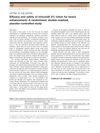TLDR The document concludes that personalized hormonal treatments are important for transgender individuals and more research is needed for non-binary treatments.
The document "The Transgender: Endocrinological Assessment" discusses the role of endocrinologists in gender-affirming treatment for transgender individuals, emphasizing the need for personalized clinical approaches. It reviews hormonal treatment strategies for both binary and non-binary transgender people, detailing the expected body modifications and safety profiles of available compounds. For trans AFAB individuals, testosterone administration can lead to increased facial and body hair, body composition changes, voice deepening, and in some cases, androgenetic alopecia. For trans AMAB individuals, oestrogens can induce female secondary sexual characteristics, including a significant reduction of terminal facial and body hair, increased body fat, and breast development. The document also discusses the use of finasteride for treating androgenetic alopecia and hirsutism, and the use of topical minoxidil for beard development. It concludes by emphasizing the need for more research on non-standardized therapies for non-binary individuals.
 50 citations
,
May 2020 in “Journal of Clinical Medicine”
50 citations
,
May 2020 in “Journal of Clinical Medicine” Non-binary transgender individuals need personalized hormonal treatments for better well-being and quality of life.
 166 citations
,
October 2018 in “Endocrine Reviews”
166 citations
,
October 2018 in “Endocrine Reviews” Hormone treatments for transgender individuals generally improve mental health and physical transition, with some health risks that require medical supervision.
 34 citations
,
November 2017 in “Gynecological Endocrinology”
34 citations
,
November 2017 in “Gynecological Endocrinology” A transwoman developed a brain tumor after nine years of hormone therapy, suggesting a possible link between the treatment and tumor development.
 9 citations
,
February 2016 in “The Journal of Dermatology”
9 citations
,
February 2016 in “The Journal of Dermatology” Minoxidil 3% lotion is effective and safe for increasing beard hair count.
 110 citations
,
October 2013 in “The Journal of Sexual Medicine”
110 citations
,
October 2013 in “The Journal of Sexual Medicine” Testosterone treatment in trans men increases body and facial hair and may lead to hair loss over time, but severe skin issues are rare.
 2295 citations
,
August 2012 in “The international journal of transgenderism/International journal of transgenderism”
2295 citations
,
August 2012 in “The international journal of transgenderism/International journal of transgenderism” The guidelines recommend informed consent for gender-affirming treatments and stress the importance of personalized, culturally sensitive care for transgender individuals.
 18 citations
,
January 2009 in “Journal of Endocrinological Investigation”
18 citations
,
January 2009 in “Journal of Endocrinological Investigation” Flutamide works better than finasteride for hirsutism, and combining both is slightly better but not much.
 October 2022 in “Springer eBooks”
October 2022 in “Springer eBooks” The document concludes that personalized hormonal treatments are important for transgender individuals and more research is needed for non-binary treatments.
 6 citations
,
April 2019 in “Endocrinology and Metabolism Clinics of North America”
6 citations
,
April 2019 in “Endocrinology and Metabolism Clinics of North America” Testosterone therapy for transmasculine individuals is generally safe with medical supervision, improves mental health, and has mixed effects on physical health.
 146 citations
,
December 2016 in “Translational Andrology and Urology”
146 citations
,
December 2016 in “Translational Andrology and Urology” Hormone therapy is essential for transgender individuals but requires careful management due to possible metabolic effects.










